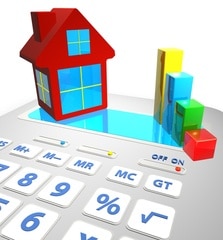Are you saving enough to buy and own a home?
As credit restrictions remain tight, lenders are requiring more cash to buy a home.
Sure, you can get an FHA loan with 3.5 percent, but if you want a conventional loan, you may have to put down at least 20 percent. That’s a hefty nut, even if homes are priced 30 to 40 percent less than they were a few years ago.
But don’t forget that you’ll need extra cash to close (unless you’re able to finance your closing costs), to prepay your homeowners insurance for the first year (if your lender requires it), and to ante in your share of property taxes.
And then there’s the fees for moving expenses – not to mention all the other things you’ll need/want to buy as soon as you move into your new home.
How much should you save when buying a home? My short answer: As much as possible.
The costs of homeownership are steep: real estate taxes, maintenance, homeowners and perhaps liability insurance and upkeep of your new home will be costly. These expenses have only one way to go and that’s up. Municipalities need more money and will raise taxes. Maintenance fees only go up, as do insurance premiums (they sometimes go down but trend upward).
But you’ll also need to replace light bulbs, broken fixtures, hot water heaters and air conditioner compressors, appliances and other items that break with use.
Unfortunately, new houses aren’t immune to high homeownership costs as well. If you buy a new construction house from a lender that took it back from a bankrupt developer, there may not be anyone there to make the necessary repairs, adjustments and punch list items new homeowners generally find in the first 90 to 120 and even 365 days after closing.
Once you own your home, you’ll be the one responsible for paying the contractor, plumber, or landscape contractors. So, you better start saving.
Conservatively, you should stash enough for a hefty down payment (so you can avoid private mortgage insurance (PMI)), plus your homeowners insurance premium and property tax contribution. (Depending on when you buy your home, you may have to kick in 6 to 8 months worth of property tax payments if you escrow for taxes and insurance. Ask your lender to calculate how much you’ll need upfront.)
You should also have several months of mortgage payments saved in an emergency account. This account shouldn’t contain your general emergency funds as well as your mortgage emergency funds. You wouldn’t want to spend your mortgage emergency funds accidentally.
Plan to spend at least $1,000 each year on maintaining your house. These funds may include having your heating and air conditioning units serviced, seal coating your driveway, snow removal or landscaping, painting or tuckpointing, pest removal or treatments, repairing leaks, and repairing or replacing appliances.
Hopefully, you won’t have to do all of these things in the same year, but you should plan on having at least some of these expenses.
One way to help save money is to learn how to maintain a home yourself instead of hiring a local handyman (or woman) to help out.
Need to replace a faucet? There are several excellent videos on YouTube and other sites that will show you how to do it. Many manufacturers have downloadable directions on their websites with additional videos and tutorials.
You might be able to paint, change light bulbs and light fixtures, and make other minor repairs yourself, which will help save money.
You may not be perfect at doing these jobs yourself at first, but the nice thing about owning your own home is you can repaint the door until it’s perfect – or you’re perfectly satisfied with it.
Watch some of our handyman YouTube videos like Step-by-Step: How to Paint a Room







Leave A Comment